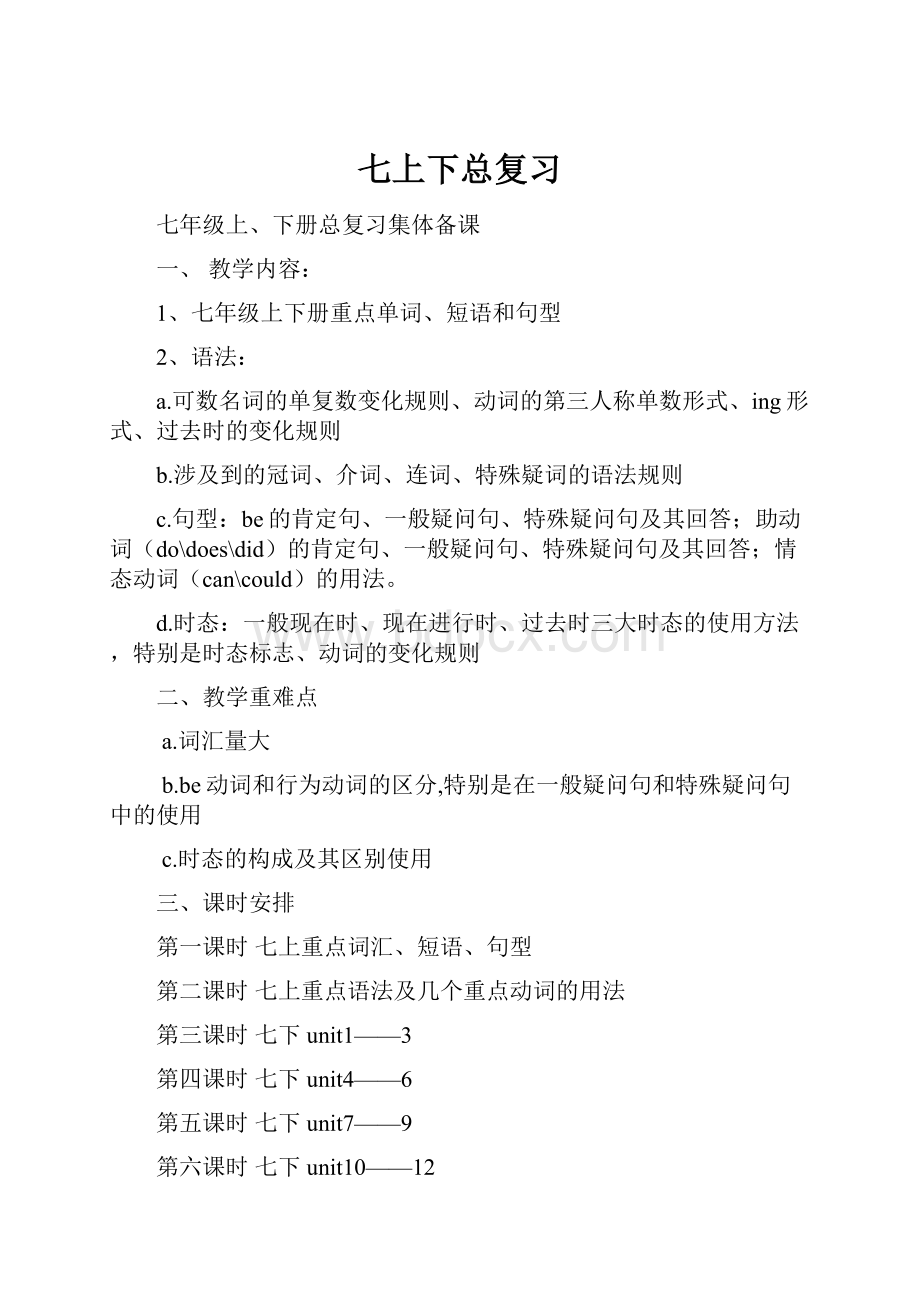七上下总复习.docx
《七上下总复习.docx》由会员分享,可在线阅读,更多相关《七上下总复习.docx(37页珍藏版)》请在冰豆网上搜索。

七上下总复习
七年级上、下册总复习集体备课
一、教学内容:
1、七年级上下册重点单词、短语和句型
2、语法:
a.可数名词的单复数变化规则、动词的第三人称单数形式、ing形式、过去时的变化规则
b.涉及到的冠词、介词、连词、特殊疑词的语法规则
c.句型:
be的肯定句、一般疑问句、特殊疑问句及其回答;助动词(do\does\did)的肯定句、一般疑问句、特殊疑问句及其回答;情态动词(can\could)的用法。
d.时态:
一般现在时、现在进行时、过去时三大时态的使用方法,特别是时态标志、动词的变化规则
二、教学重难点
a.词汇量大
b.be动词和行为动词的区分,特别是在一般疑问句和特殊疑问句中的使用
c.时态的构成及其区别使用
三、课时安排
第一课时七上重点词汇、短语、句型
第二课时七上重点语法及几个重点动词的用法
第三课时七下unit1——3
第四课时七下unit4——6
第五课时七下unit7——9
第六课时七下unit10——12
七年级上册
一、重点单词:
乐器:
guitar,drum,piano,trumpet,violin
球类:
football,soccer,basketball,volleyball,baseball,tennis,ping-pong
星期:
Sunday,Monday,Tuesday,Wednesday,Thursday,Friday,Saturday
月份:
January,February,March,April,May,June,July,August,September,October,November,December
电影:
actionmovie,comedy,documentary,thriller,BeijingOpera,cartoon
二、重点句型
1.What’sherfamilyname?
(P5)
familyname=lastname姓firstname=givenname名
姓名顺序:
英美人的名在前,姓在后。
如:
JimGreen中,Jim是firstname/givenname,Green是familyname/lastname;
中国人的姓在前,名在后。
(1)单姓单名:
姓与名的首字母分别大写。
如:
LiPing
(2)单姓双名:
名的双字写在一起,只大写第一个名的首字母。
如:
YangLiwei
(3)复姓:
把复姓写在一起,只大写第一个字母。
如:
ZhugeLiang
family(家庭)、class(班级),作主语,谓语用单数形式。
family(家庭成员)、class(同学们),作主语,谓语用复数形式。
如:
MyfamilywereeatingdinnerwhenuncleLicamein.
Ihaveafamily,thefamilyisahappyone.
2.Thanksforthephotoofyourfamily.(P17)
Thanks=ThankyouThanksalot=Thankyouverymuch.=Manythanks.
Thanksforsth./doingsth.谢谢你……
如:
Thanksforyourhelp.ThanksforhelpingmewithmyEnglish.
Thanksto…多亏…,由于…Thankstotreesandflowers,ourschoolisbecomingmoreandmorebeautiful.
3.Hereismyfamilyphoto.(P17)
以here,there等副词开头的句子,主谓倒装。
(主语为代词时则不倒装)
如:
Herecomesthebus.Hereisyourpen.Hereyouare.=Hereitis.NotonlyhaveIbeentoBeijing,butalsoIhavebeentoTaiyuan.
4.Pleasetakethesethingstoyourbrother.Canyoubringsomethingstoschool?
(P23)
take:
把东西从此处带走。
bring:
把东西由别处带来。
fetch/get:
去把东西带来(goandbring)carry:
携带,搬运(无方向性)
some和any都可以修饰可数名词复数和不可数名词。
区别如下:
some用于肯定句中,如果用于疑问句,则表示希望得到肯定的回答或表示诚意。
any用于否定句、疑问句和条件状语从句,如果用在肯定句则表示“任何一个”的意思。
5.Thatsoundsgood.(P27)
动词后用形容词作表语。
sound/seem/look/become/get/turn/taste/feel/smell/touch+adj.
sound:
声音的总称。
noise:
噪音voice:
嗓音
6.Doyoulikebananas?
(P31)
likesb.todosth.likesb.nottodosth.以此类推:
want,tell,teach,ask,
likedoingsth.:
一贯性喜欢做某事,经常性喜欢做某事liketodosth.具体某一次喜欢做某事
likev.喜欢prep.介词像……一样
7.HowmuchisthisT-shirt?
(P41)
Howmuchis/are……?
……多少钱?
It’s/They’re……
Howmuch修饰不可数名词;Howmany修饰可数名词复数它们都是“多少”的意思。
8.CanIhelpyou?
(P43)
售货员招呼顾客:
CanIhelpyou?
=WhatcanIdoforyou?
=MayIhelpyou?
顾客告诉售货员:
Yes,please.Iwanttobuy…/I’mlookingfor…/I’dliketobuy…或者:
No,thanks.Ionlyhavealook.
询问顾客想买东西的特征:
Whatcolor/size/kinddoyouwant?
向顾客推荐商品:
What/Howaboutthisone?
Thisoneischeapandnice.
顾客询问价格:
Howmuchis/are…?
Howmuchdoesitcost?
What’sthepriceofit?
买卖达成:
I’lltake/have/buy/getit.
9.Whenisyourbirthday?
Howoldareyou?
(P49)
询问年龄:
Howoldareyou?
What’syourage?
回答年龄:
主语+be+数词(+yearsold)
Heisaneight-year-oldboy.=Heiseightyearsold.
howold,howoften,howsoon,howfar,howlong,howmany,howmuch,howmanytimes,
10.Iwanttoseeanactionmovie.(P53)
wantsth.wanttodosth.wantsb.todosth.wantsb.nottodosth.
look:
发生看的动作lookat…看……see:
看见没有的结果
listen:
发生听的动作listento…听……hear:
听见没有的结果
watch:
强调观看运动着的事物或影像。
如:
看电视,看比赛,看电影,看表演等
read:
阅读,朗读如:
看书,看报,看信,看杂志,看地图
11.Canyouplaytheguitar?
(P59)
can,may,must,need是情态动词,后面必须跟动词原形一起构成谓语。
playthe+乐器play+球/棋/牌类
三、重点语法
(一)、名词的数
A.单数名词---前有a/an、the或物主代词,如:
abook、thebook、hisbook
1)规则变化1、一般情况,可数加s:
bags
2、以s、sh、x、ch结尾,加es:
boxes
3、以f、fe、结尾,把f、fe改为v加es:
shelf→shelves
4、以辅音+y结尾,把y改为i,加es:
baby→babies
5、以o结尾,复数加es:
tomatoes、potatoes或加s:
pianos、photos
2)不规则变化1、单复数词形:
sheep、Chinese、Japanese
2、复数名词:
clothes、people、police
3、特殊变化:
man→men,woman→womenchild→children,
foot→feettooth→teeth,woman-women
.前面可用many(许多)、alotof/lotsof(许多)、some(一些)、
afew(一点)howmany+可数复数
B.不可数1、没有复数形式
2、前不加a/an、数字、many、afew,后不加s
3、前可以加some、any、alotof/much、alittle
4、表数量,用量词加of词组:
acupoficecream,twocupsoficecream
5、学过的有:
broccoli、food、dessert、orange、icecream、salad、chicken、fruit、soccer、tennis、ping-pong、breakfast、lunch、dinner、、work、homework、time、Chinese、English
(二)、冠词
1.种类:
(1)不定冠词:
a/an:
aunit/anuncle
元音开头的可数名词前用an:
anegg/anapple/anorange/aneraser/ananswer/anIDcard/analarmclock/anactor/anactress/ane-mail/anaddress/anevent/anexample/anopera/anhour/anoldman/aninterestingbook/anexcitingsport/anactionmovie/anartlesson/
2)定冠词:
the:
theeggthepiano
2.用法:
定冠词的用法:
(1)特指某(些)人或某(些)物:
Therulerisonthedesk.
(2)复述上文提到的人或物:
Hehasasweater.Thesweaterisnew.
(3)谈话双方都知道的人或物:
Theboysaren’tatschool.
(4)在序数词前:
John’sbirthdayisFebruarythesecond.
(5)用于固定词组中:
inthemorning/afternoon/evening
不用冠词的情况:
(1)专有名词前:
Chinaisabigcountry.
(2)名词前有定语:
this,that,my,your,some,any,no等。
如:
Thisismybaseball.
(3)复数名词表示一类人和事:
Monkeyscan’tswim.Theyareteachers.
(4)在节日,日期,月份,季节前:
TodayisChristmasDay.It’sSunday.
(5)一日三餐前:
Wehavebreakfastat6:
30.
(6)球类棋类运动前:
Theyoftenplayfootballafterclass.Heplayschessathome.
*但乐器前要用定冠词:
Iplaytheguitarverywell.
(7)学科名称前:
Myfavoritesubjectismusic.
(8)在称呼或头衔的名词前:
ThisisMrsLi.
(9)固定词组中:
atnoonatnightbybus
(三)、时态复习
一、一般现在时
1、Be动词的一般现在时
Be动词要根据句中主语的人称和数而变化。
它有三种形式:
am,is,are
am跟在I后面,is跟单数主语,are跟复数主语及单数You后面。
如:
Iamateacher.
2、实义动词的一般现在时
一个动作经常反复地发生,就用一般现在时。
第三人称单数(he,she,it,Tom等)作主语,谓语动词要加″s″或″es″,这种动词形式简称为单三动,记住:
单三人称单三动,其它人称用原型。
如:
Theygetupatsixo’clock.Hegoestoschoolatseven-thirty.
附:
动词第三人称单数的构成规则
1)一般情况下加sget—getslike---likes
2)以s,x,ch,sh,o结尾的加es:
watch---watchesgo---goesdo---does
3)以辅音字母加y结尾的,改y为i,加escarry---carries
特殊:
have---has,be--is
(四)、几个动词的用法:
1、let后用动词原形Let’splaysoccer.
2、like及介词后动词用ing形式,如:
begoodatswimming,helpkidswithsinging,
likeplayingbasketball,Whataboutplayingtennis?
3、want加to再加原形wanttogotoamovie,wanttobeanactor
4、help+人+动词原形help+sb.+withsth/doingsth.
七年级下册
Unit1Where’syourpenpalfrom?
一.短语:
1.befrom=comefrom来自于----
2.livein居住在---
3.onweekends在周末
4.writetosb=writealettertosb给某人写信;写信给某人
5.intheworld在世界上 inChina在中国
6.penpal笔友 14yearsold14岁 favoritesubject最喜欢的科目
7.theUnitedStates美国 theUnitedKingdom英国 NewYork纽约
8.speakEnglish讲英语 likeanddislike爱憎
9.gotothemovies去看电影 playsports做运动
二.重点句式:
1Where’syourpenpalfrom?
=Wheredoesyourpenpalfrom/
2Wheredoeshelive?
3Whatlanguage(s)doeshespeak?
4IwantapenpalinChina.
5IcanspeakEnglishandalittleFrench.
6Pleasewriteandtellmeaboutyourself.
7Canyouwritetomesoon?
8Ilikegoingtothemovieswithmyfriendsandplayingsports.
三.本单元的国家,人民、语言对应。
1Canada----Canadian----English/French
2France------French------French
3Japan------Japanese----Japanese
4Australia----Australian-----English
5theUnitedStates------American----English
6theUnitedKingdom---British-----Enghish
Unit2Where’sthepostoffice?
一.Askingways:
(问路)
1.Whereis(thenearest)……?
(最近的)……在哪里?
2.Canyoutellmethewayto……?
你能告诉我去……的路吗?
3.HowcanIgetto……?
我怎样到达……呢?
4.Isthere……nearhere/intheneighborhood?
附近有……吗?
5.Whichisthewayto……?
哪条是去……的路?
二.Showingtheways:
(指路)
1.Gostraightdown/alongthisstreet.沿着这条街一直走。
2.Turnleftatthesecondturning.在第二个路口向左转。
3.Youwillfinditonyourright.你会在你右手边发现它。
4.Itisaboutonehundredmetresfromhere.离这里大约一百米远。
5.You’dbettertakeabus.你最好坐公交车去。
(You’dbetter+动词原形)
三.词组
1.acrossfrom……在……的对面acrossfromthebank在银行的对面
2.nextto……紧靠……nexttothesupermarket紧靠超市
3.between……and……在……和……之间
betweentheparkandthezoo在公园和动物园之间
among表示位于三者或三者以上之间
4.infrontof……在……前面Thereisatreeinfrontoftheclassroom.
课室前面有棵树。
inthefrontof……在……(内)的前部Thereisadeskinthefrontoftheclassroom.
课室内的前部有张桌子。
5.behind……在……后面behindmyhouse在我家后面
6.turnleft/right向左/右拐
ontheleft/rightof……在某物的左/右边ontheleftofourschool在我们学校的左边
onone’sleft/right在某人的左/右边onmyleft在我左边
7.gostraight一直走
8.down/along……沿着……(街道)down/alongCenterStreet沿着中央街
9.intheneighborhood=nearhere在附近
10welcometo……欢迎来到……
11.take/haveawalk散步
12.thebeginningof…………的开始,前端
atthebeginningof……在……的开始,前端
inthebeginning起初,一开始
13.havefun=haveagoodtime=enjoyoneself玩得开心,过得愉快
我昨天玩得很开心。
Ihadfunyesterday.
Ihadagoodtimeyesterday.
Ienjoyedmyselfyesterday.
14.haveagoodtrip旅途愉快
15.takeataxi坐出租车
16.到达:
getto+地方 gethere/there/home到这/那/家
arrivein+大地方IarriveinBeijing.
arriveat+小地方Iarriveatthebank.
reach+地方
17.goacross从物体表面横过goacrossthestreet横过马路
gothrough从空间穿过gothroughtheforest穿过树林
18.on+街道的名称。
Eg:
onCenterStreet
at+具体门牌号+街道的名称Eg:
at6CenterStreet
三.重难点解析
1.enjoydoingsth享受做某事的乐趣,喜爱做某事
Ienjoyreading.我喜爱读书。
到目前为止,我们学了两个特殊的动词finish和enjoy,都是要带doing.
Ifinishcleaningtheroom.我扫完了这间屋子。
2.hopetodosth希望做某事Ihopetopassthisexam.我希望通过这次考试。
hope+从句Ihopetomorrowwillbefine.我希望明天将会晴朗。
(从句即是一个小句子,这个小句子又放在大句子中,从属于大句子,所以叫从句。
如tomorrowwillbefine是一个从句,它又放在Ihope的后面,形成句中有句。
)
3.if引导一个表示假设的句子。
IfIhavemuchmoney,Iwillgotothemoon.如果我有许多钱,我就会去月球。
Ifyouarehungry,youcanbuysomefoodinthesupermarket.
如果你饿了的话,你可以在超市买一些食物。
四.本单元的反义词、近义词配对
1new—old2quiet---busy3dirty---clean4big----small
Unit3Whydoyoulikekoalabears?
一.重点词组
e